As of 2018, the United State Census Bureau revealed that only 16% of the trucking industry is comprised of black or black-identifying drivers. While that percentage may seem underwhelming, it has improved by 25% since 2014. Transfix cares about diversity and in an effort to understand the full story behind those numbers, we went straight to the source to discuss how African Americans feel about the industry. The drivers we spoke to, from rookies to veterans, shared their insights, the challenges they face within the community, along with why they chose trucking as their career path.

The trucking profession is often one that has been introduced as a family business. Drivers get behind the wheel for the first time usually because their parents, grandparents, or aunts and uncles were in trucking at one point or another. This represents a barrier to entry for the black community, with few in the older generation to look to as a role model. Owner-operator Leta Lagaunda has another theory as to why there are significantly fewer black drivers. “Trucking is listed as one of the top 10 most dangerous professions. So fear has a lot to do with it.” She continues, “most of the black drivers that I’ve spoken to became truck drivers because someone they knew drove trucks and told them that the money was good.”

For Dante Davis, a driver in Savannah, Georgia who is currently in training to be an owner-operator, trucking was not a family business. “Truck driving was never mentioned at all – it was never considered a career in my family. I was told my grandfather wanted to drive but he never did.” Davis continued, “sports, music, dance – those are things that are stereotypically associated with African Americans, but not things like mechanics, trucking driving, etc.” When asked how the trucking industry can promote a larger presence of black drivers, Davis took a moment and advised, “everyone wants to make money, go home to their families, be safe – if we can just understand we’re all truck drivers and we all want to get to where we need to go safely, then we can level the playing field for more African American drivers to join.”
Tractor-trailer driver, Shanta Roberts might have considered driving at a younger age “if trade schools offered an option to obtain a CDL”. Currently, in order to seek your CDL license, prospective drivers would need to seek a full-time driver training program that’s held by independent companies throughout the nation that can take as little as six weeks or as long as six months. Lagaunda echoes the sentiment that resources shouldn’t be so limited or specialized, “I do believe that there should be more education and platforms to encourage black drivers, especially black women to enter this field. I also believe that the education process should start in our communities and at the elementary school level.”

Widespread and affordable CDL training programs in high schools and colleges, along with the introduction of trucking on an elementary level may be a long time coming, there is reason for optimism. Online communities are already providing collective resources, peer mentoring, and training programs to those who seek them. “It was Sharae Moore’s S.H.E Trucking Facebook group where I discovered other women who looked like me,” Lagaunda continues, “women like Tiffany Echols-Hanna, Dee Sova, and Caprell Evans encouraged and told me that I could do this with my big hair, eyelashes, lip gloss, and all. I am forever grateful for these women.” In 2017, The Wall Street Journal worked with Women in Trucking to conduct a survey where 4.4 out of 10 women felt safe while on the job. It’s a stat that organizations like S.H.E. Trucking are looking to change for the better.
Regardless of where the percentage the black-identifying community of drivers is at, Roberts believes that becoming a driver is absolutely possible regardless of background, education, or resources. She encourages, “never let anyone discourage you from your dreams and goals. Whatever you do, just don’t give up. You can do it, because I did!”
Frequently Asked Questions (FAQ)
-
What specific initiatives or programs are companies and industry groups implementing to increase diversity and inclusion within the trucking industry, especially for black-identifying individuals?
Answer: Companies and industry groups are increasingly recognizing the need for diversity and inclusion initiatives within the trucking sector. Efforts may include targeted recruitment campaigns, mentorship programs, and partnerships with organizations dedicated to supporting underrepresented groups in the workforce. -
How are the challenges and barriers faced by black truck drivers being addressed at the industry level to ensure equal opportunities and treatment?
Answer: The challenges and barriers faced by black truck drivers, such as discrimination, lack of equal opportunities, and underrepresentation, are complex issues. Industry-wide efforts to address these challenges could involve policy changes, awareness campaigns, and the establishment of support networks to promote inclusivity. -
What are the success stories or case studies of black-identifying individuals who have progressed in their trucking careers, highlighting the pathways and support systems that helped them succeed?
Answer: Success stories serve as powerful examples of overcoming barriers and achieving career advancement. Typically, such narratives highlight personal determination, community support, and sometimes organizational initiatives that facilitate career progression.



![[Webinar Recap] The Market Rebalance is Coming: Critical Strategies to Fortify Your Carrier Network](https://transfix.io/hubfs/Transfix_February2023/images/truckcarrier.jpg)
